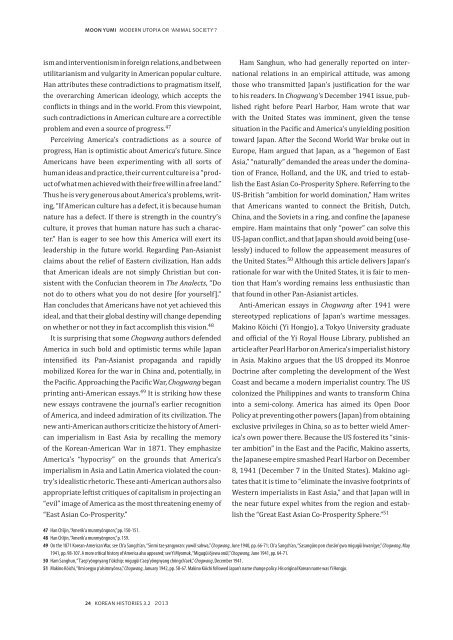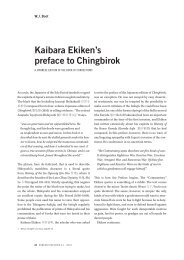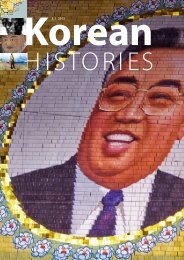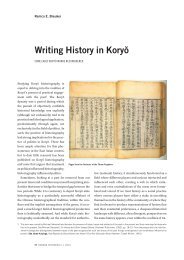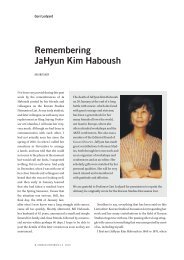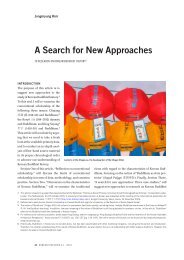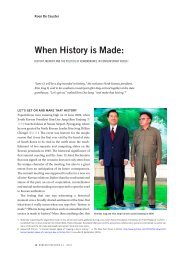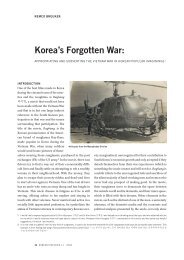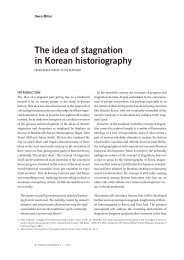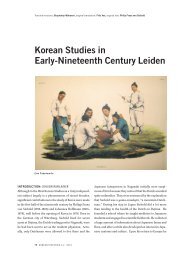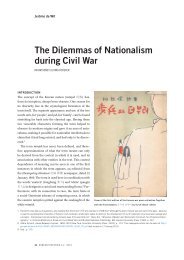You also want an ePaper? Increase the reach of your titles
YUMPU automatically turns print PDFs into web optimized ePapers that Google loves.
Moon Yumi Modern Utopia or ‘Animal Society’?<br />
ism and interventionism in foreign relations, and between<br />
utilitarianism and vulgarity in American popular culture.<br />
Han attributes these contradictions to pragmatism itself,<br />
the overarching American ideology, which accepts the<br />
conflicts in things and in the world. From this viewpoint,<br />
such contradictions in American culture are a correctible<br />
problem and even a source of progress. 47<br />
Perceiving America’s contradictions as a source of<br />
progress, Han is optimistic about America’s future. Since<br />
Americans have been experimenting with all sorts of<br />
human ideas and practice, their current culture is a “product<br />
of what men achieved with their free will in a free land.”<br />
Thus he is very generous about America’s problems, writing,<br />
“If American culture has a defect, it is because human<br />
nature has a defect. If t<strong>here</strong> is strength in the country’s<br />
culture, it proves that human nature has such a character.”<br />
Han is eager to see how this America will exert its<br />
leadership in the future world. Regarding Pan-Asianist<br />
claims about the relief of Eastern civilization, Han adds<br />
that American ideals are not simply Christian but consistent<br />
with the Confucian theorem in The Analects, “Do<br />
not do to others what you do not desire [for yourself].”<br />
Han concludes that Americans have not yet achieved this<br />
ideal, and that their global destiny will change depending<br />
on whether or not they in fact accomplish this vision. 48<br />
It is surprising that some Chogwang authors defended<br />
America in such bold and optimistic terms while Japan<br />
intensified its Pan-Asianist propaganda and rapidly<br />
mobilized Korea for the war in China and, potentially, in<br />
the Pacific. Approaching the Pacific War, Chogwang began<br />
printing anti-American essays. 49 It is striking how these<br />
new essays contravene the journal’s earlier recognition<br />
of America, and indeed admiration of its civilization. The<br />
new anti-American authors criticize the history of American<br />
imperialism in East Asia by recalling the memory<br />
of the <strong>Korean</strong>-American War in 1871. They emphasize<br />
America’s “hypocrisy” on the grounds that America’s<br />
imperialism in Asia and Latin America violated the country’s<br />
idealistic rhetoric. These anti-American authors also<br />
appropriate leftist critiques of capitalism in projecting an<br />
“evil” image of America as the most threatening enemy of<br />
“East Asian Co-Prosperity.”<br />
Ham Sanghun, who had generally reported on international<br />
relations in an empirical attitude, was among<br />
those who transmitted Japan’s justification for the war<br />
to his readers. In Chogwang’s December 1941 issue, published<br />
right before Pearl Harbor, Ham wrote that war<br />
with the United States was imminent, given the tense<br />
situation in the Pacific and America’s unyielding position<br />
toward Japan. After the Second World War broke out in<br />
Europe, Ham argued that Japan, as a “hegemon of East<br />
Asia,” “naturally” demanded the areas under the domination<br />
of France, Holland, and the UK, and tried to establish<br />
the East Asian Co-Prosperity Sp<strong>here</strong>. Referring to the<br />
US-British “ambition for world domination,” Ham writes<br />
that Americans wanted to connect the British, Dutch,<br />
China, and the Soviets in a ring, and confine the Japanese<br />
empire. Ham maintains that only “power” can solve this<br />
US-Japan conflict, and that Japan should avoid being (uselessly)<br />
induced to follow the appeasement measures of<br />
the United States. 50 Although this article delivers Japan’s<br />
rationale for war with the United States, it is fair to mention<br />
that Ham’s wording remains less enthusiastic than<br />
that found in other Pan-Asianist articles.<br />
Anti-American essays in Chogwang after 1941 were<br />
stereotyped replications of Japan’s wartime messages.<br />
Makino Kōichi (Yi Hongjo), a Tokyo University graduate<br />
and official of the Yi Royal House Library, published an<br />
article after Pearl Harbor on America’s imperialist history<br />
in Asia. Makino argues that the US dropped its Monroe<br />
Doctrine after completing the development of the West<br />
Coast and became a modern imperialist country. The US<br />
colonized the Philippines and wants to transform China<br />
into a semi-colony. America has aimed its Open Door<br />
Policy at preventing other powers (Japan) from obtaining<br />
exclusive privileges in China, so as to better wield America’s<br />
own power t<strong>here</strong>. Because the US fostered its “sinister<br />
ambition” in the East and the Pacific, Makino asserts,<br />
the Japanese empire smashed Pearl Harbor on December<br />
8, 1941 (December 7 in the United States). Makino agitates<br />
that it is time to “eliminate the invasive footprints of<br />
Western imperialists in East Asia,” and that Japan will in<br />
the near future expel whites from the region and establish<br />
the “Great East Asian Co-Prosperity Sp<strong>here</strong>.” 51<br />
47 Han Ch’ijin, “Amerik’a munmyŏngnon,” pp. 150-151.<br />
48 Han Ch’ijin, “Amerik’a munmyŏngnon,” p. 159.<br />
49 On the 1871 <strong>Korean</strong>-American War, see Ch’a Sangch’an, “Sinmi tae yangyoran: yuwŏl sahwa,” Chogwang, June 1940, pp. 66-71; Ch’a Sangch’an, “Sasangŭro pon chosŏn’gwa migugŭi kwan’gye,” Chogwang, May<br />
1941, pp. 98-107. A more critical history of America also appeared; see Yi Myomuk, “Migugŭi ŏjewa onŭl,” Chogwang, June 1941, pp. 64-71.<br />
50 Ham Sanghun, “T’aep’yŏngnyang t’ŭkchip: migugŭi t’aep’yôngnyang chŏngch’aek,” Chogwang, December 1941.<br />
51 Makino Kōichi, “Ilmi oegyo p’alsimnyŏnsa,” Chogwang, January 1942, pp. 58-67. Makino Kōichi followed Japan’s name change policy. His original <strong>Korean</strong> name was Yi Hongjo.<br />
24 <strong>Korean</strong> <strong>Histories</strong> 3.2 2013


